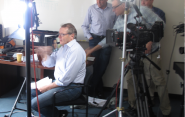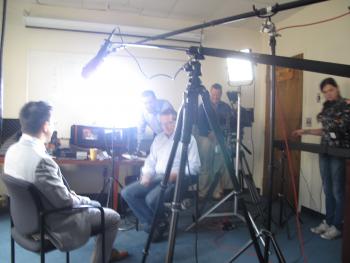AGLP Fellows Enter Era of the Video Resume

Putting your resume in the form of an interactive video can help it stand out among the many other job hopefuls. And to really impress, get one made by the Emmy-award winning former producer of “20/20” and “60 Minutes.”
 That’s what 15 graduate students did last week over two days when Nxtact visited the School of Engineering and Applied Science to create two- to three-minute video resumes. SEAS Deputy Dean Vince Wilcynski, who heads up the Advanced Graduate Leadership Program (AGLP), knows Nxtact co-founder Rob Wallace through their participation in the FIRST Robotics Competition and invited the company to campus.
That’s what 15 graduate students did last week over two days when Nxtact visited the School of Engineering and Applied Science to create two- to three-minute video resumes. SEAS Deputy Dean Vince Wilcynski, who heads up the Advanced Graduate Leadership Program (AGLP), knows Nxtact co-founder Rob Wallace through their participation in the FIRST Robotics Competition and invited the company to campus.
“We make a resume that’s interactive and multimedia,” said Wallace. “It really crosses over to self-marketing, and that’s what people have to do these days.”
John Ketterer, who co-founded Nxtact with Wallace in 2015, said the idea for the company came partly from observing how younger people were processing information.
“You look at the millennials, everything is so visual and quick, it’s a natural progression,” he said. “The way that they learn now, with the iPads and phones – technology is so prevalent in their lives – this just makes sense.”
Much of Wallace’s career was spent producing the TV news magazine shows “60 Minutes” and “20/20.” He also worked with Barbara Walters on her many in-depth personal interviews, where he developed a style of profiling a diverse set of subjects in a very thorough and visual way. While figuring out their company’s approach to this new era of job-seeking, Wallace said he took a cue from his news production work. “It hit me: we should do Barbara Walters-style profiles.”
The company’s video resumes distill the job seeker’s accomplishments and personality into a few minutes. People connect emotionally with stories, not with the bulleted items of a resume. That’s why most of the video is the applicants’ accomplishments are told through stories, as applicants are peppered with questions ranging from “What do you do to relax and recharge?” to “What gets you up in the morning?”
“Part of our approach is teaching people how to tell their stories,” said Wallace, who added that he hopes to return to Yale soon. “They tell us about a specific problem that they’ve faced. That’s classic storytelling - you know from watching movies that you get interested as soon as the hero encounters a problem, and you learn about him by how he solves it.”
Jonathan Chen, who’s working toward a Ph.D in biomedical engineering, was among those who gave the video resume a try. While the traditional resume is valuable for listing achievements, he said, a video streamlines the process of the in-person interview. Although it meant getting used to a room full of lights and rolling cameras, Chen said he enjoyed the experience.
“It was nice to tell the story in a conversational manner,” he said. “I felt that my passion towards the work I have done through my life was more properly displayed through the medium of video.”
The study of first impressions plays a big role in the company’s approach. Some studies indicate that non-verbal signals, such as tone of voice, play a bigger role in how a speaker’s message is interpreted. Many experts have noted that the first few minutes of a job interview determine the applicant’s success. A video resume would save everyone a lot of time.
“We talked to a director of a human resources department and she said, ‘My gosh, I wish could just go through and scan through 20 two-and-a half to three-minute videos of people,” Ketterer said. “I think we’re going in that direction.”
For more information, go to the Nxtact website.

